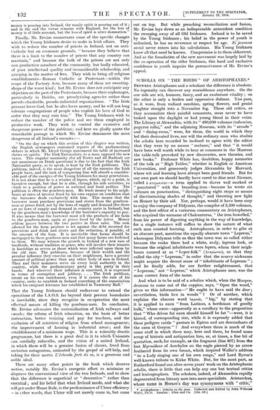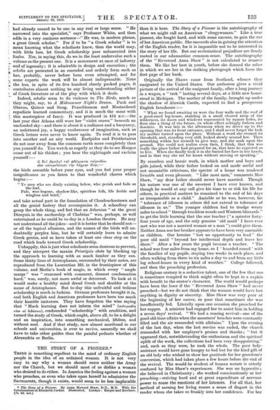SCHOLIA ON " THE BIRDS " OF ARISTOPHANES.* BETWEEN Aristophanes
and a scholiast the difference is absolute. No ingenuity can discover any resemblance anywhere. On the one side are wit, humour, fancy, and an exuberant vitality ; on the other is only a leaden and oppressive dulness. You pass, as it were, from radiant sunshine, spring flowers, and genial laughter straight into a November fog. These old critics, as they accumulate their painful comments, seem never to have looked upon the daylight or had young blood in their veins. The Library at Alexandria, with its " 490,000 volumes (volumina, papyrus rolls)," and the adjoining Museum, with its " arcade " and " dining-room," were, for them, the world in which they led their desiccated lives, nor will the ordinary man who studies the scholia here recorded be inclined to agree with the editor that they were by no means " recluses," and that " it would have been well worth while to hear at commons in the Museum the table-talk provoked by new discoveries, new theories, and new books." Professor White has, doubtless, happy memories of the talk at " High Tables," whether in English or American Universities, and generously judges Alexandria by Harvard, where wit and learning have always been good friends. But for our own part we should hardly have cared to dine next Nicanor, called o crryaariat—a term applied to slaves well marked or " punctured " with the branding-iron—because he wrote six volumes on punctuation, " distinguishing eight stops as means of discriminating shades of thought," and throwing new light on Homer by their aid. Nor, perhaps, would it have been easy to enjoy the company of Didymus, the compiler of 3,500 volumes, and the first editor of a variorum commentary on Aristophanes, who acquired the surname of Chalcenterus, " the iron-bowelled," from his power of digesting anything in the way of knowledge, for a single instance will suffice to show the nature of what such men counted learning. Aristophanes, in order to gibe at an obscure poet, mentions the equally obscure town " Lepreus," whereupon Didymus tells us that the town was so called either because the rocks there had a white, scaly, leprous look, or because the original inhabitants were lepers, whom their neigh- bours sneered at as " Leper-folk" (Aerplayras), so that they called the city " Lepreum," in order that the scurvy nickname might acquire the decent sense of " inhabitants of Lepreum " ; and he finally adds, for our further enlightenment, that " Lepreum," not " Lepreus," which Aristophanes uses, was the more correct form of the name.
And what is to be said of a scholion which, when the Hoopoe, desirous to come out of the coppice, says, " Open the wood," gives us this information—" He ought to have said the door ;
nevertheless, birds live in woods " Or of another, which explains the obscure word Xapiv6s, " big," by stating that it is applied to oxen " from Larinus, a herdsman of goodly bulk," whose oxen—apparently as a corollary to the proposition that " Who drives fat oxen should himself be fat "—were, it is hinted, of corresponding size, while it is expressly added that these pedigree cattle " pasture in Epirus and are descendants of the oxen of Geryon " Y And everywhere there is much of the same stuff in which there may, here and there, be found some scrap of historic and antiquarian lore, or, at times, a fine bit of quotation, such, for example, as the fragment (line 807) from the lost Myrmidons of Aeschylus on the eagle pierced by an arrow feathered from its own breast, which inspired Waller's address " to a Lady singing one of his own songs," and Lord Byron's well-known tribute to Kirke White. But, for the most part, as Rutherford found out after seven years' work on the .Aristophanie scholia, there is little that can help any one but textual critics and lexicographers. The scholars, indeed, of Alexandria rapidly degenerated from literary men into mere specialists. Aristarchus, whose name in Horace's day was synonymous with " critic," • Aristophanes : Scholia on the Ares. Collected and Edited by John William White, Ph.D. London ; Ginn and Co. Ills. 65.1 had already ceased to be one in any real or large sense. " He narrowed into the specialist," says Professor White, and then adds in a very ominous sentence—" He was, in modern phrase, a great Greek scholar." For if to be " a Greek scholar " is to mean knowing what the scholiasts knew, then the world may,
: with little loss, let Greek scholarship pass unlamented into limbo. Nor, in saying this, do we in the least undervalue such a - volume as the present one. It is a monument at once of industry and of ingenuity; it is admirable in design and execution ; the
ro. scholia are presented in an emended and orderly form such as has, probably, never before been even attempted, and for some experts the work will be almost indispensable. None
; the less, in spite of its five hundred closely packed pages, it contributes almost nothing to any living understanding either ! of Greek literature or of the play with which it deals.
Indeed, scholia seem to do violence to The Birds, much as ; they might, say, to A Midsummer Night's Dream. Puck and Oberon, Quince and Snug, Peaseblossom and Mustardseed
, repudiate learned commentary, and it is much the same with this masterpiece of fancy. It was produced in 414 B.c.—the last year that Athens still wore her "violet crown" beneath an unclouded sky—and there is about it a radiance and a buoyancy, • an unfettered joy, a happy exuberance of imagination, such as Greek letters were never to know again. To read it is to pass into another and an airy world. Euelpides and Peisthetairus do not soar away from the common earth more completely than you yourself do. You watch as eagerly as they do to see Hoopoe come out of his thicket ; you hear the nightingale and exclaim yourself :-
W ZEI; 13acreXer,rob Obyparor robpve8tou olov Karep.eXtratre rijv X141,01P trATIV —
the birds assemble before your eyes, and you feel your proper insignificance as you listen to that wonderful chorus which begins :-
" Ye men who are dimly existing below, who perish and fade as the leaf,
Pale, woe-begone, shadow-like, spiritless folk, life feeble and wingless and brief,"
and take actual part in the foundation of Cloudcuckootown and all the genial foolery that accompanies it. A schoolboy can grasp the whole thing, and feel that an Athenian " at the great Dionysia in the anchorship of Chabrias" was, perhaps, as well entertained as he could be to-day in a London theatre. He may not understand all the jokes—and it is better that he should not— or all the topical allusions, and the names of the birds will un- doubtedly perplex him, but he will certainly learn to admire Greek genius, and so have taken at least one clear step on the road which leads toward Greek scholarship.
Unhappily, this is just what scholiasts seem desirous to prevent, and they interpret the maxim Principiis obsta by blocking up the approach to learning with as much lumber as they can. Some thirty lines of Aristophanes, surrounded by their notes, are reproduced from the Laurentian MS. in the frontispiece of this volume, and Merlin's book of magic, in which every " ample marge " was " crammed with comment, densest condensation hard," was, surely, not more awful or deterrent. To look at it would make a healthy mind dread Greek and shudder at the name of Aristophanes. But to-day this unfruitful and tedious scholarship is much in fashion. German professors brought it in, and both English and American professors have been too much their humble imitators. They have forgotten the wise saying that " Much learning does not inform the mind" (woXvita0117 v6oy ou oaCtO'KE1), confounded " scholarship " with erudition, and turned the study of Greek, which ought, above all, to be a delight
and an inspiration, into something mechanical, lifeless, and without soul. And if that study, now almost moribund in our schools and universities, is ever to revive, assuredly we shall have to take other guides than the painful pedants whether of Alexandria or Berlin.



















































 Previous page
Previous page